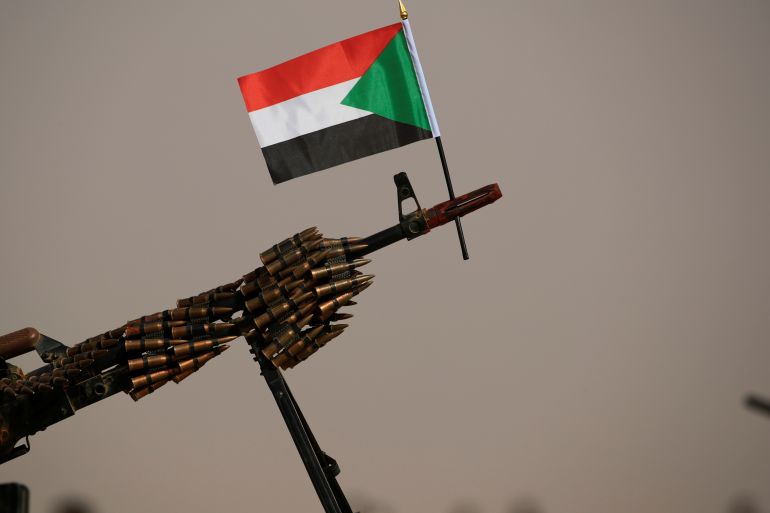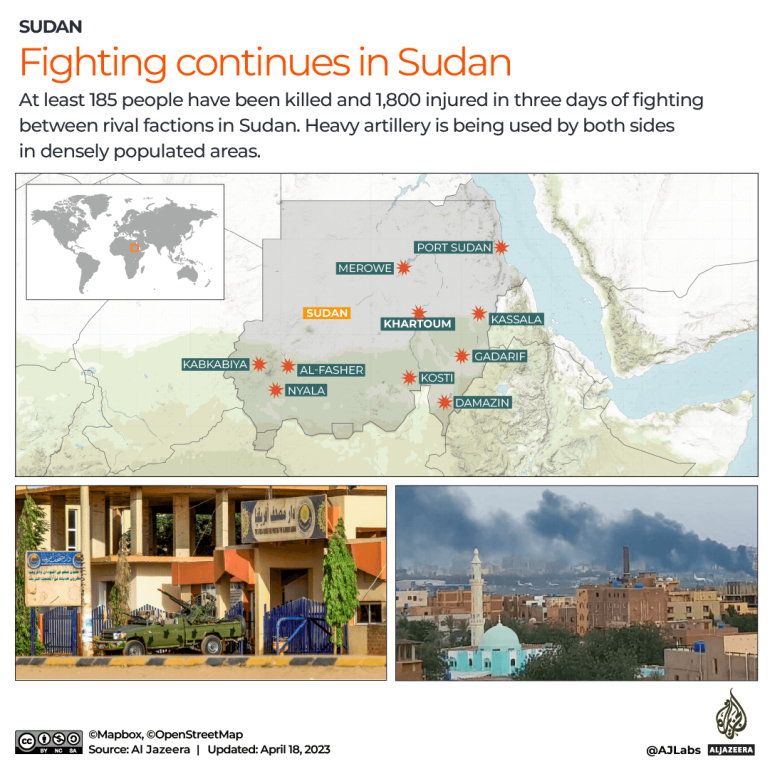Protracted war predicted in Sudan with threat of intervention
Analysts warn the battle for capital Khartoum is expected to be long and bloody but the army should capture the city since it has a larger military arsenal.

Sudan’s violent power struggle between the feared paramilitary Rapid Support Forces (RSF) and the army looks even and could carry on for months, even years, analysts say.
That trajectory threatens to fracture the country as well as splinter the very forces fighting each other.
Keep reading
list of 4 itemsIn Sudan, civilians are trapped and doctors in despair
Egyptian army says 177 soldiers evacuated from Sudan back home
Sudan’s generals reject negotiations as ceasefire fails
Over time, experts told Al Jazeera, the army is likely to gain the upper hand in the conflict – thanks to its aerial advantage and the logistical support it receives from Egypt – but not a decisive victory.
However, the RSF will have enough regional help – mostly from the United Arab Emirates – to survive and fight on.
“Egypt and the Emirates enabled these armies to become what they are: resistant to the population’s calls for democracy and to each other,” said Jonas Horner, an independent researcher specialised in Sudan.
The battle for Sudan’s capital Khartoum is expected to be long and bloody, but the army should capture the city since it has a larger military arsenal, added Sharath Srinivasan, author of When Peace Kills Politics: International Intervention and Unending Wars in the Sudans.
He said the RSF may eventually retreat to its stronghold in the western province of Darfur, as well as infiltrate and capture small pockets of land elsewhere.
“I think the army … can degrade the RSF’s fundamental capability more than the RSF can degrade the army. But the RSF’s reach and strength across the country will persist,” said Srinivasan.

Threats from within
The leader of the RSF, Mohamad Hamdan “Hemedti” Dagalo, is engaged in a zero-sum game for power with top military commander Abdel Fattah al-Burhan.
The former hails from Darfur and was a leader in the Arab “Janjaweed” militias that spearheaded state-backed mass killings in the region from 2003-2009.
In 2013, Sudan’s then-authoritarian leader Omar al-Bashir tasked Hemedti to command RSF, a force designed to thwart military coups and put down counterinsurgencies across the country.
But six years later, Hemedti cooperated with the military to sideline al-Bashir, giving him a clear path to becoming the second most powerful man in the country, behind al-Burhan.
Both men are now fierce enemies despite cooperating to derail the country’s transition to democracy through a coup in October 2021. That marriage was short-lived as each threatened to consolidate power for himself, leading them to turn their guns on each other.
Now as the war persists, the real threat to their rule may emerge from within their own forces, explained Jihad Mashamoun, a political analyst specialising in Sudan.
He told Al Jazeera top military officials in the army, who are tied to the political Islamic movement in Sudan, pressured al-Burhan to defang Hemedti because he threatens their power. He stressed the army’s top brass will not accept any outcome other than the full demobilisation of the RSF and Hemedti’s exile from Sudan.
“I have reason to believe that army officers pressured al-Burhan for this final showdown with the RSF. So if he doesn’t follow through in disintegrating the RSF, then there could be a coup against him,” Mashamoun said.
“I see that only happening if al-Burhan accepts to negotiate with Hemedti without him leaving the country.”
‘The doom scenario’
Hemedti is also vulnerable from within his own ranks – and tribe. The top RSF brass consists of senior officers from the Arab Rizeigat tribe, which hails from Darfur. However, many local leaders in the tribe are suspected to have a greater loyalty towards Musa Hilal, a local sheikh and former Janjaweed leader.
Hilal is a rival of Hemedti. After relations soured between the former and the government, al-Bashir empowered Hemedti to undercut Hilal. In 2017, the RSF was tasked with arresting him and capturing a gold mine he and his supporters controlled in Darfur.
Hilal was eventually released from prison thanks to a pardon by the civilian-military transitional government in March 2021, six months before the coup.
Hilal’s whereabouts are now unknown, but he has his own militia and many supporters in the Rizeigat. He is also suspected to have loyalists in RSF.
“The observation people are making is the possible disintegration of the RSF from within. The reading is that a lot of Rizeigat fighters would consider allying against Hemedti and with Musa Hilal,” said Anette Hoffmann, a Sudan expert with the Clingendael Institute, an independent think tank in The Hague.
“This is just one component of the doom scenario. Civil war along ethnic lines with regional destabilisation and further disintegration of the RSF, rather than us having two homogenous blocs with clear territorial control,” she added.
Taking sides
With a protracted conflict likely, analysts say the international community must pressure third actors not to join the conflict.
Domestically, both the Justice and Equality Movement and the Sudanese Liberation Movement of Minni Minawi – two rebel groups from Darfur that later backed Hemedti and al-Burhan’s military coup in October 2021 – should be talked out of taking sides, stressed Srinivasan.
He added the forces of the Sudanese People’s Liberation Army – North (SPLA-N), led by Abdel Aziz al-Hilu, should also be urged not to participate in the fighting.
SPLA-N is the strongest rebel group in Sudan and controls significant territory in the Nuba Mountains.
“One of the risks is how armed actors can end up acting opportunistically, which is a really bad scenario because that embroils a much more civil war dynamic where multiple actors are involved. That would be very messy,” said Srinivasan.
Other experts added coordinated efforts must also be made to mitigate the war economy, which means pressuring neighbouring and regional states to remain neutral.
There have already been reports of Egypt stepping up support for al-Burhan, while Libya’s eastern commander Khalifa Haftar has sent at least three planes filled with military aid to the RSF. Ironically, Egypt is one of Haftar’s main backers in Libya.
The conflict risks getting more interwoven with regional rivalries and power struggles, warned Horner.
“In almost all neighbouring countries, there is an al-Burhan supporter and a Hemedti supporter. So, if the [conflict] tilts against one of them, then we could see friends come to the aid of the losing side,” he told Al Jazeera.